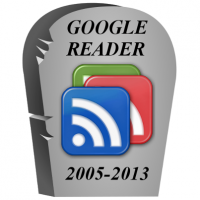I am an avid user of Google Reader because I am one of the supposed minority of internet users who derive news, blog posts, webcomics, and other bits of information from a plethora of sources. Reader was by no means the first web-based RSS reader and feed organization app, but it surely turned out to be one of the best out there. It even came out with functionality that allowed it to receive feeds from a site that doesn’t release RSS feeds.
Applications like Reader isn’t just for the information sponges and news addicts, either. Keeping track of various blogs relating to your interests, friends, favorite celebrities, can be quite a challenge, and Reader makes it terribly easy. For content creators and aspiring pundits, Reader is just as much of a godsend. All you need to get your ideas to spread is cheap WordPress hosting (or free, if you’re that much of a cheapskate) and an RSS feed that you willingly provide.
On the first of July, Google Reader is going to go the way of Google Wave and other Google Labs products that didn’t quite garner critical mass: they’re going to mothball the service. That would have been understandable if Reader was some hipster app that nobody has heard about, but the adverse reactions from the movers and shakers all over the intarwebs kinda tells you that this is not the case. A lot of people, particularly those who absorb and share information from numerous sources to everyone else, rely on Google Reader.
Why would the biggest non-evil internet company shut down a perfectly good service? The entertaining meme video of the Führer ranting about its demise reveals more truth about the matter than one would initially presume. Google is concentrating its efforts on Plus, and perhaps this is just one of many decisions it had to make in order to drive more users to their social media network to get their fix of information. There are other theories, but the fact does remain that they have already marked the day of deactivation.

So, what do the about-to-be disenfranchised users of Google Reader have as possible courses of action? The need to conveniently and efficiently collect and disseminate numerous pieces of news and other information is still present, so the search for the next great feed manager must begin.
Highlights of Contents
Like most other internet denizens, I have a Twitter account, and have subscribed to Twitter feeds of those people and organizations I want to derive information from. For the most part, it’s a trouble-free and mobile-friendly experience. This is great for regular updates and idle chit-chat. The app falls short primarily on organizing the sources of the feeds into meaningful categories, and searching for specific information released by the aforementioned sources isn’t the best.
Twitter has always been a part of my opening lineup of tabs, but this is not an adequate replacement for Reader.
Google+
Well, that was supposedly one of the reasons why Reader was going to be retired; to drive more traffic towards Unsurprisingly, I also do have an active (okay, semi-active) Google+ presence, and I do visit it for the insights of pundits, celebrity bloggers, and industry luminaries. I could go as far as saying that I prefer the navigability and interface over that of Facebook, but that’s missing the entire point. Reader is like a newspaper to me, and that’s how I want my news: all there, no fancy interface, pulled from specific sources, and properly categorized.
If we were talking about where I’d go once Facebook became too trashy, I’d definitely go to Plus. For an heir to Reader, I’ll pass and keep searching.
Feedly
I just started getting into this service as it seemed to be getting the most press as the de facto service to switch to once Google Reader kicks the bucket. It makes no attempt to hide it, either (quite the opposite), as the current front page of the site touts the supposed fact that over 3 million former Google Reader users have already moved in. I also find that the interface it has in both desktop and mobile platforms to be neat navigable enough. Overall, this is a solid candidate… call me “traditional,” but I guess I am just more at home with the interface I got used to with Reader.
The Old Reader
I don’t even remember where I got the tip for this site, but I went ahead and registered to it. Conveniently so, they even provide simple instructions on how you can export your contacts from Reader (via Google Takeout) to The Old Reader. The interface is quite similar to Reader, with some differences and things I’d liked changed here and there. So far, it’s similar enough in functionality to what I’m used to that I have made it one my opening tabs. I hope this application gets more development not only to become like Reader, but to inevitably exceed it.
About the Author
Stacey Thompson is a professional writer, marketer, entrepreneur, and a lover of weird little animals. She is based in San Diego, California, and is being the usual information collector and distributor that she is, even without Google Reader. Her gal gang has a blog, Word Baristas.
